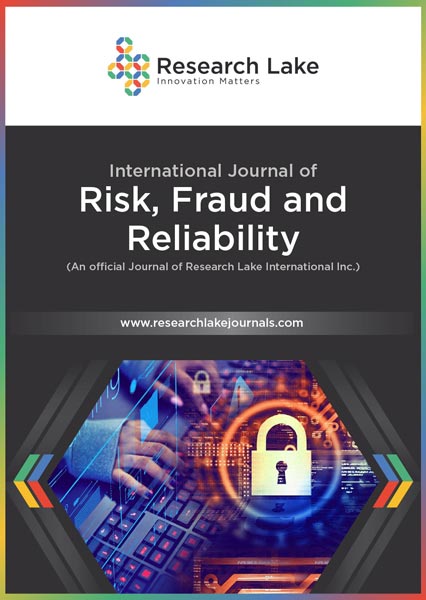
Peer Review Policy
IJRFR establishes peer review to adhere to an independent and unbiased policy that adheres to double-blinded peer-reviewed principles. The editor-in-chief is responsible for the final decision based on reports from peer-reviews and reviews from designated editors. If any article is not accepted for publication then authors of papers are notified promptly. All submitted manuscripts are considered as confidential documents.
Peer-Review Process:
- Manuscript submitted by author will be received by the Journal editorial office.
- Author will receive an acknowledgment by an email which consist of manuscript unique reference number, this manuscript number can be used in all further communications.
- All newly submitted manuscripts are first considered by the Section editor of the journal and preliminary quality check will be conducted for Plagiarism checking.
- Author will receive an email within 48 hours about the update of submitted article. If the manuscript does not fall within the scope of the journal, if it is incomplete, if it does not have proper description about the research and if the manuscript is plagiarized then it will be rejected in first stage.
- Manuscript which are accepted under preliminary quality check for further review process, then the papers are sent out for double-blind peer review. Authors will receive an initial decision on the manuscript within 21- 30 days on an average and it will be published online within 45 days from the initial submission date.
- If there is a case of revision required, all the suggestions or comments of editor and reviewers will be sent to author along with the original version of manuscript. Author should submit the revised version as per the given suggestions along with the rebuttal to editorial office within the due date given by journal manager or section editor.
- If the revision due date is not sufficient for author to submit the revised manuscript then author can request for extension of timeline writing to editorial office. Final decision of the manuscript will depend on the Section editors/Editor-in-chief of the journal after checking the original and revised submission.
- If articles complete review process and accepted for publication, then authors can see their papers published online in Archive page. Editorial office will take care of submitting the published articles to various indexing sites.
Timeline of Review:
Authors will receive an initial decision on the manuscript within 21-30 days. Once the article has been accepted for publication it will be published online within 7 working days from the day of its acceptance. If author have any important results or supplementary files to be included and wants to publish, then they should mention in the cover letter while submitting the manuscript.
Reviewer Guidelines:
Reviewers plays significant role in peer review process and they have significant responsibilities toward authors, editors, and readers. Publishing the peer reviewed articles in scientific journals depend on reviewers or scientific referees who typically volunteer their expertise and time. To evaluate a manuscript minimum two reviewers are required to complete the review process and their valuable feedback or suggestions helps to improve the quality of article. In some cases, there will be strong disagreement or controversy or rejection regarding the merits of the work, an additional review may also be required to conduct by another reviewer or one of the journal’s editors might give an evaluation.
Reviewer Selection
Reviewer selection will be done from scientific data bases, Universities and research institutions based on their expertise which is most closely matches the manuscript’s topic and invite them to review the paper.
Ideally, the reviewer selection process done by excluding reviewers from the same institution as that of the author(s) and by asking reviewers to acknowledge any potential conflict of interest. Reviewers are requested to disclose to the editor if any personal or professional connection to the author(s) and decline the assignment if they cannot review in a timely manner.
Reviewer’s responsibilities toward author:
- Providing written, unbiased feedback in a timely manner on the academic merits and the scientific significance of the work, together with the documented basis for the reviewer’s opinion
- Specify whether the writing is clear, brief, and rating the work’s composition, scientific accuracy, originality, paper comes under the scope of journal and for readership.
- Avoiding personal comments or criticism.
- Maintaining the confidentiality of the review process by not sharing, discussing with third parties, or disclosing information from the reviewed paper
Reviewer responsibilities toward editors:
- Reviewer should inform to the editor immediately if he/she unable to review in a timely manner and can provide the names of other potential reviewers.
- Reviewers should follow with the editor’s given instructions on the journal’s Reviewer policy for the scope, content, and quality of the review.
- Reviewer should describe the scientific merit, originality, and scope of the work, indicating instructions or suggestions to improve it and recommending acceptance or rejection of the article to publish it online.
- Reviewer should notify editor about any conflict of interest, violation of ethical treatment of humans or animal subjects or any other similarities between the reviewed manuscript and any published paper.
- Reviewer should be away from direct author contact.
- Reviewer should ensure that the methods are properly explained to allow the reader to judge the scientific merit of the research work.
Responsibilities of Reviewers:
- Each reviewer should maintain confidentiality about manuscript under review process, it should not be shared or discussed with anyone outside the review process unless necessary and approved by the editor.
- Reviewers should not copy the submitted manuscripts and should not use the knowledge of manuscript content for any other purpose which is not related to the review process.
- Reviewer comments or suggestions should acknowledge positive aspects of the material under review, negative aspects should be identified constructively and mention the improvements needed.
- Reviewers should clarify clearly enough that editors and authors can understand the basis of the remarks or suggestions.
- The reviewer should make sure that an observation or argument that has been already reported be accompanied by a relevant citation and should promptly alert the editor when the reviewer becomes aware of duplicate publication.
- One of the main responsibilities of reviewer is to identify strengths of the manuscript and provide valuable suggestions to help the author resolve weaknesses in the work. A reviewer should respect the intellectual independence of the author.
- Reviewers should accept an assignment only if they have adequate expertise to provide an authoritative assessment.
- Reviewers should give comments completely based on the manuscript’s scientific merit, originality, quality of writing and based on the relevance to the scope of journal.
- A reviewer should not take scientific, financial, personal, or any other advantage of article content which is available through the communication of peer review process.
Reviewers should give prompt response and follow the instructions to complete a review, and submitting it in a timely manner. Reviewer should be available to complete the review of the article within the requested due date. If it is not possible to meet the deadline, then the reviewer should promptly contact the editorial office to extend the time or decline to perform the review by mentioning the reason.
Type of review process
For Researchlake International journals, the peer review is performed as a double-blind system, in which the reviewers do not know the identity of the authors or their affiliation and authors do not know identity of reviewers or their affiliation.
Rewarding Reviewers
Researchlake International journals thank and encourage reviewers for their generous volunteer efforts. Journal provides the reviewers with reviewer certificate on regular basis like semiannually and annually along with medical education credits for completed reviews based on the review
This may take the form of a published list of reviewers that appears in the journal on a regular (annually, semiannually) basis. Journals may also offer continuing medical education credits for completed reviews.



